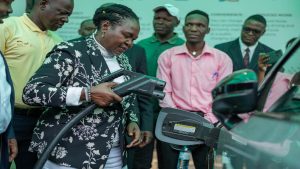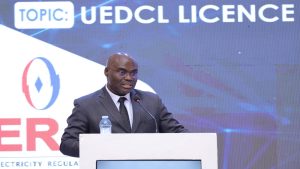Share
A new pipeline is intended to carry crude oil from the Lake Albert oilfields in Uganda to the coast of Tanzania’s Indian Ocean.
Due to criticism from environmental organizations, a number of significant Western banks withdrew from the project.
Chinese lenders will finance the majority of the US$3 billion debt Uganda needs to build a crude oil pipeline after Western bankers withdrew due to significant objections from environmental organizations. Uganda needs this financing to build the pipeline.
The East African nation of Uganda anticipates concluding negotiations with the China Export & Credit Insurance Corporation (Sinosure) and the Export-Import Bank of China (Eximbank) to finance the construction of the East African Crude Oil Pipeline (EACOP) by the end of next month, according to the Ministry of Energy and Mineral Development.
The pipeline, which “is the largest portion – above 50% of the debt,” is being funded by Eximbank in partnership with Sinosure, the Chinese government’s state-owned provider of export credit insurance, according to the ministry’s permanent secretary, Irene Bateebe.
“The negotiations [with Chinese lenders] for a financial close are nearing their conclusion. By the end of October this year, we anticipate closing the debt component and mobilizing the majority of the project’s funding, according to Bateebe, who made the announcement on Friday.
The pipeline from the oilfields in Lake Albert to a storage and loading facility in the Tanzanian port of Tanga will cost Uganda around $5 billion. The debt-to-equity ratio for financing is set at 60:40, which means that US$3 billion will be secured as debt and US$2 billion will be financed by shareholder contributions to equity.
TotalEnergies owns 62% of the pipeline, followed by the Tanzania Petroleum Development Corporation with 15%, the Uganda National Oil Company with 15%, and China National Offshore Oil Corporation (CNOOC) with 8%.
The Lake Albert oilfields in northwest Uganda would supply crude oil for the 1,443km (896-mile) pipeline that would run to Tanga, Tanzania, on the Indian Ocean, where the oil would then be exported to international markets.
In addition to the Chinese lenders, Bateebe stated that Uganda anticipates receiving some finance from the African Export-Import Bank and the Islamic Development Bank of Saudi Arabia.
Initially, many Western-backed lenders had shown interest in funding the pipeline, according to Bateebe, but they eventually withdrew in response to fierce opposition from environmental and human rights organizations who claimed the oilfields and pipeline posed a threat to the area’s delicate ecosystem and the livelihoods of thousands of people. Furthermore, environmentalists claim that Uganda is defying international efforts to move away from fossil fuels for energy.
We did notice that several Western banks stopped funding the project, but we always advise people to check at their other friends. We had other buddies who were prepared to join us. We started to look East,” stated Bateebe. Previously, she said, a sizable amount of the debt was supposed to come from Western lenders.
At the border of western Uganda and the Democratic Republic of the Congo, on the banks of Lake Albert, the British company Tullow Oil found economically viable oil resources in 2006. There are 1.4 billion barrels of recoverable oil among Uganda’s estimated 6.5 billion barrels of crude oil.
But it wasn’t until last year that the project’s stakeholders revealed a final investment decision of US$10 billion. This comprises the development of the oilfield and the building of the pipeline that would transport crude oil collected from Hoima in western Uganda.
On Uganda’s eastern banks of Lake Albert, the Kingfisher oilfield is run by CNOOC. The oilfield will be developed with an estimated investment of US$2–3 billion, with a peak production capacity of 40,000 barrels per day.
The Tilenga oilfield, run by French oil conglomerate TotalEnergies, is the other, larger oilfield. Its development is expected to cost between US$4 billion and US$6 billion. The daily output will be 190,000 barrels.
The development and production wells for Kingfisher and Tilenga began to be spudded (started being drilled) in January and June 2023, respectively. The landlocked East African nation hopes to become an oil exporting nation by 2025.
Under the hashtag #StopEACOP, environmental organizations have increased pressure on influential financiers in the West to renounce investment plans. According to these organizations, a number of big banks, including Barclays, Credit Suisse, Citi, HSBC, Deutsche Bank, Morgan Stanley, and JP Morgan Chase, have said they will not support the pipeline.
The Industrial and Commercial Bank of China (ICBC) and Standard Bank of South Africa (SAB) are serving as the organization’s principal loan arrangers and financial advisors, respectively, for EACOP, according to BankTrack, a monitoring, advocacy, and NGO assistance organization that focuses on banks and the activities they finance. ICBC has a 20% holding in Standard Bank, the biggest lender in South Africa.
The project was not to be financed by Japan’s Sumitomo Mitsui Banking Corporation either, though it was unclear if it was still serving as a debt arranger and advisor.
The topic came up in the European Parliament last year, where lawmakers voted a resolution urging a stop to the project due to environmental and human rights concerns. They also cautioned TotalEnergies against supporting the project.
The West’s drive for Uganda to abandon its oil plans, according to Uganda, does not consider the entire picture.
“That’ll be incredibly unfair. The energy shift will no longer be just; rather, it will be unjust, according to Bateebe, who also added that Uganda still thinks the oil and gas industry can coexist with its aspirations for renewable energy.
“By providing funding, the oil industry, which we are developing in an environmentally responsible manner, will assist us in making the transition to a cleaner energy source. If not, it is insufficient to tell nations like ours that we must transit and that there is no finance strategy for the transition, according to Bateebe.
Last year, the Chinese embassy in Uganda defended Uganda’s initiatives and criticized the European Union for attempting to obstruct the advancement of Uganda’s oil ambitions. The EU “should not use the excuse of environmental and human rights issues to block development” of the oilfields and the pipeline, according to Zhang Lizhong, the ambassador of China to Uganda.









